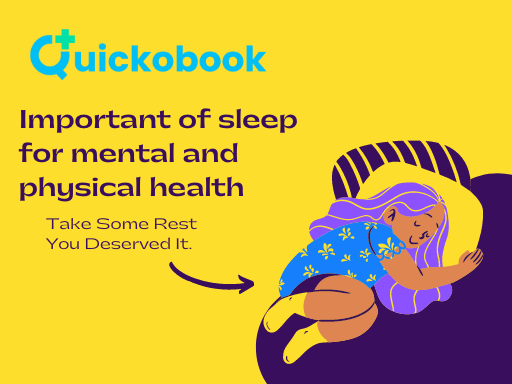Sleep is a state of reduced mental and physical activity in which consciousness is adapted and certain sensory activity is forbidden. While sleeping there there is a marked decrease in muscle activity and interactions with the surrounding environment.
The world where we live has evolved in such a way that people never seem to focus on good sleep. People have become so modern that we now believe in the 24/7 struggle culture, and this is mainly affected by the never-ending notifications from our smartphones the professional pressure from our job, lacking family time, and social life balance all these things tend to attract our attention around the clock and make us feel like we have not lived the day fully.
Does Sleep Matter?
The modern pace of life barely gives us time to stop and rest for a while, we have evolved in such a way that having a good sleep is a dream. But sleep is as important for good health as diet and exercise. Low-quality sleep has been linked with health conditions like cardiovascular disease, obesity, and mental illness. While poor sleep is common among those with cardiovascular disease, some research indicates that poor sleep can be a contributing cause. Short sleep duration of less than seven hours is correlated with coronary heart disease and increased risk of death from coronary heart disease. Sleep duration greater than nine hours is also correlated with coronary heart disease, as well as stroke and cardiovascular events.
In both children and adults, short sleep duration is associated with an increased risk of obesity, with various studies reporting an increased risk of 45–55%. Other aspects of sleep health have been associated with obesity, including daytime napping, sleep timing, the variability of sleep timing, and low sleep efficiency. However, sleep duration is the most studied for its impact on obesity.
In simple words, sleep is like clicking the reset button of our body, it's the time when our body pauses and takes rest while our body repairs tissues, strengthens the immune system, and builds muscles.
The Physical Benefits of Sleep
During sleep, most of the body's systems are in an anabolic state, helping to restore immune, nervous, skeletal, and muscular systems, these are vital processes that maintain mood, memory, and cognitive function, and play a large role in the function of the endocrine and immune systems.
• When we sleep, our body starts repairing itself: While in a good sleep, our body repairs itself by processes like releasing growth hormones, which help in tissue repair and muscle growth. We have often heard that athletes and fitness enthusiasts care so much about getting enough sleep on a daily basis. Without it, all those hours spent at the field or gym will not pay off as much as they should.
• Our heart too needs rest:
Not only our muscles but our heart too needs rest, while in a good sleep, our body's pressure drops down which gives our heart a much-needed break. Even studies have also shown that people who don’t get enough sleep are at a higher risk for cardiovascular diseases, including hypertension and heart attacks.
• Our Immune System:
And standing in the line another important aspect of our body, our immune system. We have often noticed that after not getting enough sleep we are more likely to catch a fever.
This happens because sleep is also important for our immune system for proper functioning. While sleeping, our body produces cytokines, which are proteins that fight inflammation and infection. Therefore without having good sleep our body’s ability to fight off illness decreases which may create vulnerable conditions from the common cold to more serious conditions.
Relation of Sleep with Weight Management
Sleep can also affect our physical health by having an impact on our body weight. When we don't get enough sleep, our body’s regulation of hunger hormones goes high which results in releasing more amount of hormone ghrelin. The hormone ghrelin makes us feel hungry along with the hormone leptin the hormone that signals fullness also decreases. And as a result, we are more likely to overeat and gain weight. It’s no wonder that sleep deprivation has been linked with obesity.
Even, sleep deprivation can affect our body’s ability to produce insulin, insulin is the hormone that is responsible for controlling blood sugar levels of our body. Without enough insulin, our body’s blood sugar levels may go up which further can increase the risk of developing type 2 diabetes.
Mental Health and Sleep: The Crucial Connection
• Sleep can even lead to various temporary issues in our daily life schedule. We must have experienced effects like irritability, difficulty concentrating on daily life tasks, and a bad sense of fogginess after having a bad sleep last night. This makes everything harder and more confusing for us for the day, even simple things can make us feel bored and angry.
• Sleep is also essential for regulating our mood. After not having enough sleep our body becomes confused and produces
more stress hormones like cortisol, this hormone is responsible for increased feelings of stress and anxiety. And if not controlled lack of proper sleep can even contribute to the development of mood disorders such as depression and anxiety.
Adding more to it,
Having a good sleep is not only about avoiding the bad effects on our bodies. A good sleep can even enhance the positive benefits to our body. When we rest well our brain comes to a better condition to handle stress, solve problems, and make quick decisions every day. A good sleep can have a positive impact on our life making us feel good in every possible way.
While on the other hand, lack of good sleep can have negative effects on our health such as making it harder for us to focus, remember things, and manage emotions, leading to a cycle where stress and poor sleep reinforce each other.
Making Sleep a Priority
The quality of sleep may be evaluated from an objective and a subjective point of view. Objective sleep quality refers to how difficult it is for a person to fall asleep and remain sleeping, and how many times they wake up during a single night. Poor sleep quality disrupts the cycle of transition between the different stages of sleep. Subjective sleep quality in turn refers to a sense of being rested and regenerated after waking from sleep.
Human sleep needs vary by age and amongst individuals, sleep is considered to be adequate when there is no daytime sleepiness or dysfunction. Moreover, self-reported sleep duration is only moderately correlated with actual sleep time as measured by actigraphy, and those affected with sleep state misperception may typically report having slept only four hours despite having slept a full eight hours.
Researchers have found that sleeping 6–7 hours each night correlates with longevity and cardiac health in humans, though many underlying factors may be involved in the causality behind this relationship.
Sleep duration can also vary according to season. Up to 90% of people report longer sleep duration in winter, which may lead to more pronounced.
By the time infants reach the age of two, their brain size has reached 90 per cent of an adult-sized brain; a majority of this brain growth has occurred during the period of life with the highest rate of sleep. The hours that children spend asleep influence their ability to perform cognitive tasks. Children who sleep through the night and have few night-waking episodes have higher cognitive attainments and easier temperaments than other children.
Children need many hours of sleep per day to develop and function properly, up to 18 hours for newborn babies, with a declining rate as a child ages.
Read Also: Why Mental Health Is Important
Steps Towards Good Sleep
First, it's important to maintain a regular sleep schedule every day.
This may include going to bed on time and waking up at the same time every day, which can help regulate our body’s internal clock making it easier to fall asleep and wake up feeling refreshed.
Creating a sleep-friendly environment should be in focus. Our bedroom is the place which we mainly use to sleep and take rest being quiet and steady. So we should make the room more sleep-friendly by designing it in such a way this may include investing in blackout curtains, earplugs, or a white noise machine to help us create the perfect sleep environment.
This is the one of most important things to keep in mind to improve our sleep quality.
Limiting the screen time before bed, the blue light emitted by phones, tablets, and computers interferes with our body’s production of melatonin, the hormone responsible for making us fall asleep. Avoiding screen exposure before bedtime is advised for better sleep quality.
The final thing, focusing on what we eat and drink daily. These include avoiding heavy meals, caffeine, and alcohol before sleep as these can interfere with our sleep. Meanwhile, we should adopt relaxing activities like reading, meditating, or taking a warm bath before going to sleep.
The quality of sleep may be evaluated from an objective and a subjective point of view. Objective sleep quality refers to how difficult it is for a person to fall asleep and remain sleeping, and how many times they wake up during a single night. Poor sleep quality disrupts the cycle of transition between the different stages of sleep. Subjective sleep quality in turn refers to a sense of being rested and regenerated after waking from sleep.









Comments (0)
No comments yet. Be the first to share your thoughts!
Leave a Comment